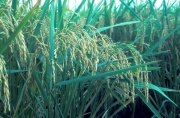Difference between revisions of "Rice husk"
Jump to navigation
Jump to search
(username removed) |
|||
| (3 intermediate revisions by 2 users not shown) | |||
| Line 2: | Line 2: | ||
== Description == | == Description == | ||
| − | The outer seed covering from rice grains, a cereal obtained from genus ''Oryza sativa''. Rice husks are separated from the seed during milling. When burnt, the husks can yield an [ | + | The outer seed covering from rice grains, a cereal obtained from genus ''Oryza sativa''. Rice husks are separated from the seed during milling. When burnt, the husks can yield an [[ash%20%28residue%29|ash]] which is greater than 95% [[silica|silica]]. Rice husk ash has been used as a [[filler|filler]], an [[abrasive|abrasive]], and as a [[refractory%20material|refractory material]]. |
== Comparisons == | == Comparisons == | ||
| Line 8: | Line 8: | ||
[[media:download_file_240.pdf|Properties of Common Abrasives]] | [[media:download_file_240.pdf|Properties of Common Abrasives]] | ||
| + | == Resources and Citations == | ||
| − | + | * Robert Fournier, ''Illustrated Dictionary of Practical Pottery'', Chilton Book Company, Radnor, PA, 1992 | |
| − | |||
| − | |||
| − | * | ||
* ''Van Nostrand's Scientific Encyclopedia'', Douglas M. Considine (ed.), Van Nostrand Reinhold, New York, 1976 | * ''Van Nostrand's Scientific Encyclopedia'', Douglas M. Considine (ed.), Van Nostrand Reinhold, New York, 1976 | ||
| − | * | + | * Random House, ''Webster's Encyclopedic Unabridged Dictionary of the English Language'', Grammercy Book, New York, 1997 |
* ''The American Heritage Dictionary'' or ''Encarta'', via Microsoft Bookshelf 98, Microsoft Corp., 1998 | * ''The American Heritage Dictionary'' or ''Encarta'', via Microsoft Bookshelf 98, Microsoft Corp., 1998 | ||
Latest revision as of 15:10, 15 October 2020
Description
The outer seed covering from rice grains, a cereal obtained from genus Oryza sativa. Rice husks are separated from the seed during milling. When burnt, the husks can yield an ash which is greater than 95% Silica. Rice husk ash has been used as a Filler, an Abrasive, and as a Refractory material.
Comparisons
Properties of Common Abrasives
Resources and Citations
- Robert Fournier, Illustrated Dictionary of Practical Pottery, Chilton Book Company, Radnor, PA, 1992
- Van Nostrand's Scientific Encyclopedia, Douglas M. Considine (ed.), Van Nostrand Reinhold, New York, 1976
- Random House, Webster's Encyclopedic Unabridged Dictionary of the English Language, Grammercy Book, New York, 1997
- The American Heritage Dictionary or Encarta, via Microsoft Bookshelf 98, Microsoft Corp., 1998
